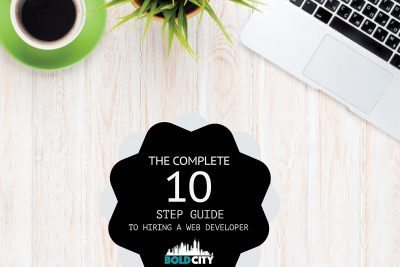10 Steps To Hiring A WordPress Web Developer
10 Steps To Hiring A WordPress Web Developer
If you would rather download this guide as a complete PDF e-book, you can do so by clicking the button below:
Intro
Choosing the right web developer may be the most important decision you make when starting, or trying to expand a business. For most people, a website is a companies opportunity to make a first impression, and we all know how many chances you get to do that.
The world is changing around us, more and more business is being generated online. The largest online retailer in the world (Amazon) doesn’t even have a retail storefront. It’s time you take a deeper look at your website, or lack of one, and answer some important questions: Is your website capturing leads? Is your websites message and appearance inline with how you see your business? Is it effectively working as your best sales agent?
Whether you have an existing website in place that you’re looking to upgrade, starting from scratch on a new venture, or have an existing business where you would like to tap into the power of online marketing, this guide can help you in locating the best web developer for your needs.
Who I Am
My name is Cabe Nolan. I have been developing websites & software for over 7 years (as of 2015) and providing web server management for over 10 years. On top of that I’m an entrepreneur. I’ve founded a successful web development & consulting company, manufactured, imported and distributed a successful physical product, and developed numerous other online tech companies (Two Way Resume, Dock Skipper, Boatzo, & WP Cover to name a few). I am eager to connect with other small (and large) business owners and find nothing more satisfying than others success, especially on the internet.
My Web Development & Marketing Firm
I founded Bold City Agency LLC in 2014. Prior to that, CN Design LLC was the name we worked under and both companies still exist to an extent. We decided to switch names as we felt CN Design did not encompass our team as a whole. Yes, I am still the primary developer on most projects. Everything that gets done has my stamp of approval. However, we are a collective team of contractors that regularly collaborate on projects to ensure the client receives the greatest end result possible. This hybrid approach is a mix between a full service design agency employing 10-15 full time employees and a single proprietor. Having worked in all of the previously mentioned setups, I have found this hybrid approach still delivers the quality work of an agency, but we are able to work with clients on a price point closer to that of a single proprietor.
While I could talk about my development firm for hours, that’s not what this guide is about. This guide is about finding you the best match for your particular situation. And while I hope you give us a chance to submit a proposal, I understand if you go a different direction, as long as the candidate has been properly screened and are the best match for your businesses needs.
Without further delay, onto the good stuff…
1. Web Design Is An Unregulated Business
Understand this point before you begin your developer search. The barriers to entry for the web design profession are practically non-existent. Anyone can put up a website and declare themselves a website designer with “years of experience” and testimonials from friends and family. Template websites and CMS systems like WordPress (while great) have made it possible for almost anyone to setup a basic website without knowing or understanding a single line of code. The most important tool you need to learn is how to pick out a real developer from a fly-by-night sole proprietor.
2. Actual Web Developers vs Visual Web Designers
In the last few years, sites have come into the market allowing people to build websites using drag and drop visual editors. This has enabled many graphic designers with little to no web development skills, an even easier avenue of website creation. There are several issues with these kinds of sites:
- Don’t be fooled, there is absolutely no “web development” going on here.
- You don’t own the site. When sites are built with these types of editors, they can only be hosted with the company on which they were created. Therefore, if the company decides to jack up its hosting costs or if they flat out go out of business, your entire website goes with it.
- They have major limitations. Since it is a drag and drop editor, you are limited to the code you can modify and/or add. This in turn limits the functionality you are able to add. This type of site may seem like it will work fine initially, but a year down the road when you need that new feature integrated will it be possible? Or will you have to start over developing a new website?
- The people creating these websites have no experience with UI (user experience) or engagement practices. Typically, people creating these types of sites are graphic designers who only care about one thing: make it “pretty”. Your website should be a business asset first and foremost, it should be your best sales person. While ‘pretty’ is important, the most important aspect is getting the user to interact with your website and complete calls to action.
- Many times, the cost to do these types of websites with graphic designers will be equivalent to paying an actual web developer.
When you are searching for a web developer/designer, make sure you ask them what platform they are going to build on. Ask them what framework they use. Ask them if they are actually going to develop your website or if they’re just going to create something visually appealing. Ask how the website will drive traffic & generate leads or sales.
3. Custom Made Themes vs. Pre-Made Themes
So you’ve determined that a web developer you’re considering does not use a drag and drop visual editor, that’s a start! The next question you ask should be in regards to themes. Platforms like WordPress have revolutionized the way people are able to build websites. However, they have also created thousands of pre-made themes so called “developers” can utilize. Now don’t get me wrong, WordPress is great! I use WordPress on a daily basis for many client sites. However, there is a right way to use WordPress and a wrong. Many developers will use pre-made themes to build your site. Some will be upfront about this and tell you, others will not and therefore it is an important question to ask. There are some who will argue that using pre-made themes is an okay practice, I however disagree in 90% of cases. Here’s why:
- You’re paying for a custom website, designed to fit your business. How can a web developer say that a pre-made theme, being sold to thousands of people is perfect for your business?
- Themes are packed with features you do not need. When developers create themes to be sold, they pack it full of as many features as they can. It creates additional selling points and more people will buy it. The issue: you do not want features you will not use. All this does is create additional load time for your site, thus decreasing your SEO performance, and creating more security vulnerabilities for hackers.
- Themes will come back to bite you down the road. What if a theme author stops putting out updates for security issues? What happens if you need a feature integrated that a theme does not have? You’re going to end up paying a developer five times as much to modify and secure a pre-made theme versus something that was done custom for you. Utilizing pre-made themes may seem like a great option at first, but down the road it almost always leads to regret.
- Most developers who insist on using a pre-made theme do not have ample experience developing websites. They use themes due to lack of knowledge in creating something custom. This should be a red flag unless they have very good reasoning behind it.
4. Longevity & Maintenance Considerations
You need to give this consideration now to ensure you don’t have issues down the road. Your website is a big investment and no matter how perfect the initial development work is, more than likely you’re going to want some changes down the road. Will this developer (or company) be there to support you? When developing a website there is typically several ways to do things, and no one way is necessarily right or wrong. Therefore, most developers will have their own approach. If your old web developer backs out or goes out of business, you will be paying a new developer not only to do the work but also for a considerable learning curve in understanding the old developers methods. Consider the following questions when searching for a web developer:
- Do they have references or testimonials from companies they have worked with an extended period of time (5+ years)?
- Do they operate under a legal entity (LLC, Corporation, etc.)? This can be a sign that they are around to stay.
- Do they discuss maintenance & continued work during the initial quoting process? Fly-by-night web developers will probably avoid this subject or tell you “everything” can be done on your own.
5. Location Can Be A Benefit
I’m going to touch lightly on this point as I feel it is becoming more and more irrelevant. While having a good relationship with your web developer is crucial, having him or her local to your area may or may not be necessary. With all the technology we have these days: email, video chat, screen sharing, etc., almost all communication can be handled from a computer. However, hiring a web developer local to your area can be a benefit especially if you expect a considerable amount of continued work. Being able to meet face to face and discuss your website goals and challenges you have experienced thus far can lead to greater success.
6. Search Engine Optimization
Do they actually walk the walk, or just talk the talk? Search engine optimization is often a point that arises during web development talks. Is it included in the initial price? Some developers will tell you ‘yes’ to sell you on their quote, but be sure to ask what is included. To be completely upfront, you are almost never going to get a full SEO workup on your site “included” with the web development price. Why? Because they are completely different areas of work. Yes, you may get some basic SEO work done & included in the initial development; this is what I do for my clients. This work typically includes:
- Writing quality meta titles & descriptions for the primary pages.
- Generating an XML sitemap and submitting it to major search engines.
- Ensuring the site loads quickly, there are no file errors or other issues of immediate concern.
The work mentioned above will be a start to getting your site ranked in search engines, but in order to really start rising in the rankings, you’re going to have to put in a lot more effort. Search engine optimization and general marketing is not a one-time affair. It’s a process that is never ending and often has many different aspects.
Be sure to ask the developer specific questions related to SEO. They may not have an answer and that is fine. They may strictly focus on the web development and will refer you to somebody else for the SEO work. Just don’t expect SEO to be a one-time deal, if a developer says it is, they’re lying.
7. Ability To Grow With You
Different aspects of this point have already been discussed above, but I thought it deserved its own section for re-iteration. Your website is an investment, it is supposed to grow with your business. It’s not going to be a one-time deal where you set it and forget it. If that’s what your plan is, you’re probably not going to have a successful website.
This is why it’s important to hire a developer (or company) that has a track record supporting long term-clients; a developer that is going to be around for years to come and is going to develop a website that will not only support you now, but can be used as a foundation to build upon as your business expands.
8. Security & Hosting
Be sure to ask about website security and hosting when vetting a possible web developer. If your site is built on a CMS system like WordPress, it’s going to need regular security updates. Are they going to provide it? What are the costs involved? I can’t tell you how many people contact me with a hacked or broken site, stating that the web developer never told them they needed regular updates. As a result, they end of spending several hundred dollars fixing what could have easily been avoided.
As a side note – have a website and in need of security, backups, maintenance, and optimization work? Checkout our sister company WP Cover. All in one support packages starting at $79/month.
Also ask about web hosting. This is where your site will actually reside. Do they provide hosting or have a provider they recommend? If they are a serious web developer or company they probably have a relationship with a host or provide it themselves. If they rattle off one of the big name providers like GoDaddy or HostGator or BlueHost, I would recommend running. While these are in fact big names, the service they provide is well below average. If a developer is still recommending them, they evidently have not been around long enough to experience the terrible service they actually provide.
You may also want to ask about different tiers of hosting or ways you can speed up your site beyond a basic plan. A web developer with experience in hosting should be able to discuss the benefits of a CDN (content deliver network) and other ways you can take your site to new levels. This point also goes back to the ability for a development company to grow with you.
9. Communication, Organization, & Process
An experienced web developer will have a process. They will seem organized and they will communicate in a timely manner. Organization is essential to a website, it allows your visitors to move from page to page in a way way that makes sense. If a web developer is not organized in his or her own life, how do you expect them to organize your website?
10. Ensure Device Compatibility
In todays day and age, 40-50% of your website traffic will come from mobile devices or tablet devices. Therefore, you need to ensure compatibility if you want to seem appealing to these visitors. Furthermore, in early 2015 Google announced a big algorithm changed (nicknamed mobilegeddon), that would penalize sites if they did not pass Google’s mobile-friendly test tool. Ask potential web developers if they will be using a mobile-friendly or even mobile-first framework. Run some of their portfolio sites through Google’s Mobile Friendly Test Tool to check compatibly. If the websites do not pass the test, ask the developer why this site was not designed to be mobile friendly. If they have a good answer, great! If their answer is, “the site owner didn’t request it”, ask them if they explained the downside to not building a mobile friendly site to the website owner prior to development. If this was properly explained and the site was developed in the last 4-5 years, I can’t see any owner agreeing to build a non-mobile friendly site having been educated on the downside.
In Closing
In closing, I hope this guide will assist in your search for the perfect web developer. While each developer will have their own approach and each project will have its own individual challenges, this guide should act as a general guideline that can be followed. Just ensure that you are asking the proper questions and vetting each potential candidate on their processes and reliability down the road. Ensure that you are hiring an actual web developer and don’t be fooled by the fly-by-night graphic designers posing as a developer. In the end, use common sense and you will know you’ve found the right match. As a developer and owner of a web design & marketing agency myself, I hope you will add Bold City Agency to your list of possible candidates. Please screen us just as you would any other candidate and ask us how we can take your site to new levels. Hopefully we can make a great team!








Comments:
Share Your Thoughts